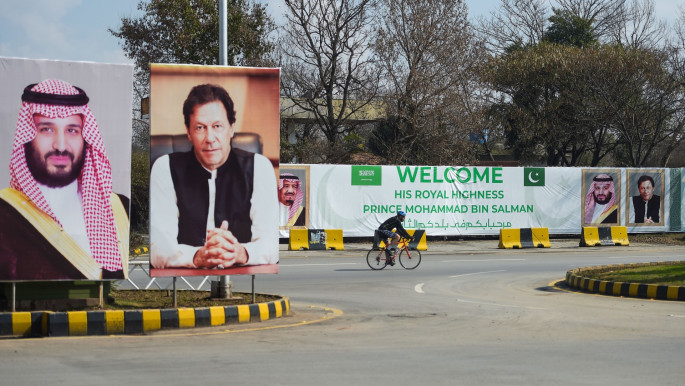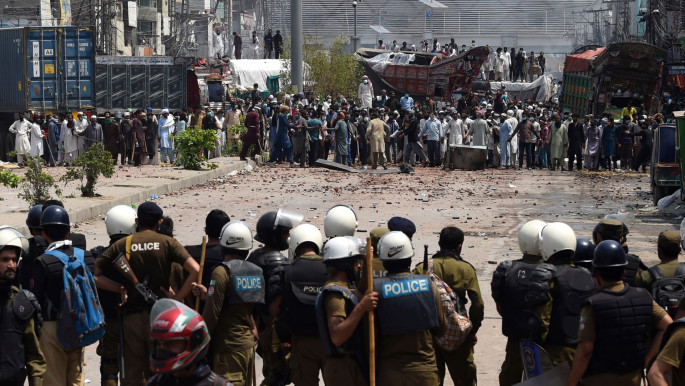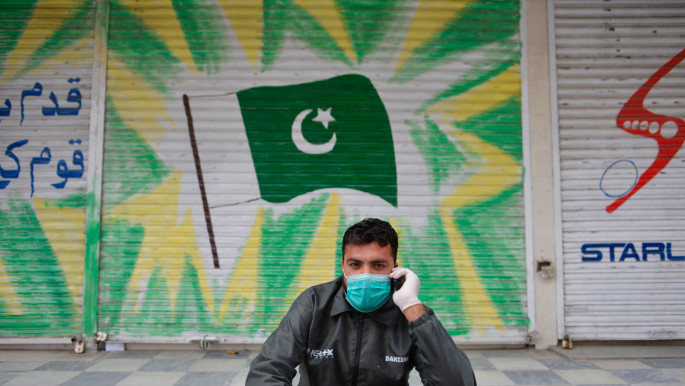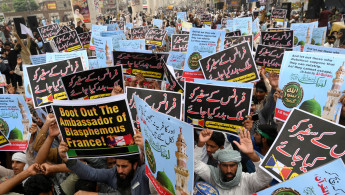What's fuelling anti-France protests in Pakistan?
The right-wing religious movement played a key role in fomenting nationwide protests in Pakistan several months ago, sparked by France's decision to defend the right to show cartoons of the Prophet Muhammad deemed blasphemous by many Muslims.
Protests have escalated again in recent weeks following the arrest of TLP leader Saad Rivzi, who was detained on 12 April after calling for new marches to demand the expulsion of France's envoy. Days after his arrest, Pakistan's interior minister announced the dissolution of the party under the country's anti-terrorism laws.
Despite the government's crackdown, violent anti-France protests have continued across Pakistan, paralysing the country. The mayhem unleashed by Tehreek-e-Labbaik Pakistan's supporters has seen key highways and access routes to major cities blocked, with six police officers killed and over 500 wounded. Some observers in Pakistan have even expressed fears of a civil war.
 |
The Pakistani government has begun debates in parliament over a resolution to expel the French ambassador, a move widely interpreted as capitulating to the hardline Tehreek-e-Labbaik Pakistan party |  |
Last week, the government opened negotiations with the radical group in a bid to contain the violence and any further deterioration of law and order. The TLP presented four demands for talks, including the release of the group's leader, the expulsion of the French ambassador, lifting the ban on the party and the dismissal of the interior minister. In return, TLP agreed to call off protests.
 |
|
| Read more: Can Saudi Arabia and Pakistan mend frayed ties? |
While some in Pakistan have welcomed the government's prudence in seeking to end nationwide protests, others have lamented the fact that a banned hardline group has so much sway over the state's decision making.
TLP: A party of anti-blasphemy activists
The government of Pakistani Prime Minister Imran Khan banned the TLP for its involvement in acts of terrorism on 15 April, but the group's dynamics and organisational strategy are complex.
First of all, TLP has no equivalent - both in ideology and objectives - with any outlawed group in Pakistan. It is not a group armed with heavy weapons, nor does it have terrorist training cells or a history of attacks. It is a politico-religious party of anti-blasphemy activists.
While the group has performed relatively well electorally for an Islamic party in Pakistan – garnering 2.1 million votes in the National Assembly in 2018 – it has mainly established itself as a major force in politics and society through its power to mobilise street protests and its relentless campaigning for the death penalty for anyone found guilty of blasphemy.
 |
Tehreek-e-Labbaik's stance on blasphemy has garnered significant support, but analysts believe that factors such as inequality, income disparities, and anger at Khan's economic performance have also driven backing for the hardline party |  |
Emerging from the Barelvi school of Islam, the group formed as a political movement to demand the release of a bodyguard accused of the high-profile 2011 assassination of the governor of Punjab, Salman Taseer, who was a critic of Pakistan's blasphemy laws and had defended the case of Asia Bibi, a Christian woman who was arrested in 2010 for alleged blasphemy and spent eight years on death row until she was acquitted. The TLP organised mass protests calling for her death after she was released, effectively forcing her to flee the country and seek exile abroad.
TLP's stance on blasphemy, a highly sensitive issue in Pakistan, has garnered significant support. Some analysts also believe that factors such as inequality, income disparities, and anger at Khan's economic performance have driven support for the hardline party.
Khan himself has been vocal on the issue of blasphemy and the publication of the French cartoons depicting the Prophet Muhammad. Last week, he said that his government and the TLP had the same goal – to end blasphemy around the word – but that their methods were different.
 |
|
| Policemen stand guard as Tehreek-e-Labbaik Pakistan supporters protest in Lahore on 18 April, 2021. [Getty] |
Speaking after a week of violent protests driven by the TLP in Pakistan, Khan said Western governments should treat people who insult the Prophet Mohammed the same as those who deny the Holocaust.
"We Muslims have the greatest love & respect for our Prophet," he tweeted. "We cannot tolerate any such disrespect & abuse."
Despite the TLP's oversized influence on the issue of blasphemy, the group remains banned in Pakistan and the parliament will now decide the fate of the French ambassador, moves which many view as short-term fixes for an intractable issue. But in addition to being accused of appeasing the radical movement, the Pakistani government is also under pressure from opposition parties.
 |
Tehreek-e-Labbaik Pakistan has established itself as a major force through its power to mobilise street protests and its relentless campaigning for the death penalty for anyone found guilty of blasphemy |  |
Pakistan's opposition backs TLP protests
The Pakistan Democratic Movement (PDM), an alliance of opposition parties headed by Jamiat Ulema-e-Islam (JUI) chief Maulana Fazl-ur-Rehman, has extended its support to the TLP's nationwide protests in a bid to further pressure the beleaguered government. Maulana also announced support for TLP's long march on Islamabad, causing potential friction among parties in the coalition.
Khan took office in August 2018 after running a campaign on zero-tolerance for corruption and a doctrine for a 'New Pakistan'. Since then, a number of political bigwigs, including former three-time prime minister Nawaz Sharif and former president Asif Ali Zardari, were sent to jail on corruption charges. Sharif managed to leave Pakistan in November 2019 for medical treatment in London, where he now lives in exile.
 |
|
| Read more: Pilgrims and pandemics: Are religious groups undermining Pakistan's fight against Covid-19? |
Khan's anti-corruption drive has been criticised both for its political motivations and lack of commitment. Last year, the main opposition parties formed the PDM to protest the government, calling Khan's government a selected, not elected, ruling body that came to power through massive rigging of the 2018 elections.
The PDM held several anti-government rallies in the country's major cities over the past year, but it could not achieve any of its main objectives, including ousting the government and holding fresh elections in the country. The PDM has also weakened due to rifts among political parties in the alliance.
Realistically speaking, Khan's selective anti-corruption drive and populist rhetoric are not issues of concern for ordinary Pakistanis, who find themselves trapped in a vicious cycle of economic hardship.
Moreover, the personnel Khan chose to translate his vision for a 'New Pakistan' into reality were largely selected from the Augean stable of corrupt, incompetent, and tried and tested political elites.
But despite mounting public frustration, Khan is persistently downplaying the severity of the economic and national crisis. Attempting to appease the radical TLP while simultaneously promoting the image of a defender of Islam seems to be a gamble that could also backfire.
Syed Fazl-e-Haider is a contributing analyst at the South Asia desk of Wikistrat. He is a freelance columnist and the author of several books including the 'Economic Development of Balochistan'



